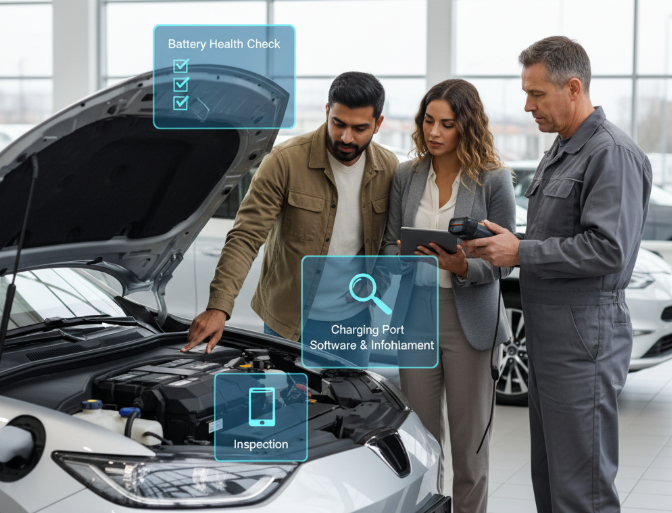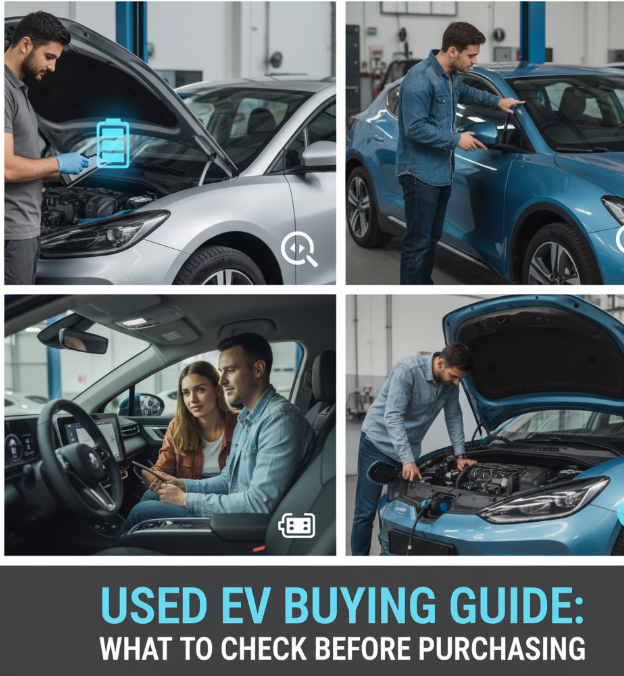Electric vehicles (EVs) are no longer just futuristic machines—they are a common sight on the roads today. With more models entering the market every year, the used EV segment is also growing rapidly. Buying a used EV can save you money, reduce depreciation costs, and make owning an electric car more affordable.
But here’s the catch: buying a used EV is not the same as buying a used gasoline car. Batteries, charging compatibility, warranties, and software updates all play a much bigger role. If you don’t know what to look for, you may end up with an EV that costs more in repairs than it saves you in fuel.
This guide will walk you through everything you need to check before purchasing a used electric car. By the end, you’ll have a clear checklist to make a confident and smart buying decision.
Why Choose a Used EV?
Before we dive into the details of what to check, let’s quickly go over why a used EV might be a great option for you:
- Lower Price: EVs depreciate faster than gas cars, which means you can often get a great deal on a 3–5-year-old model.
- Tax Incentives Don’t Always Matter: The first owner usually gets the government incentives, but you benefit by paying less upfront.
- Proven Reliability: Many EVs have fewer moving parts compared to gasoline cars, meaning less wear and tear.
- Eco-Friendly Choice: Reusing vehicles is itself sustainable, and you’re still cutting emissions compared to driving a traditional car.
Things to Check Before Buying a Used EV
Here’s where the real decision-making comes in. Let’s break it down step by step.
1. Battery Health – The Heart of an EV
The battery pack is the most important and expensive component of an electric vehicle. Unlike a fuel tank, EV batteries degrade slowly over time, reducing range.
What to Check:
- State of Health (SOH): Most EVs allow you to check battery health via the car’s dashboard or through an OBD-II scanner with EV-specific apps.
- Remaining Capacity: Compare the car’s original range with the current range. A 10–15% drop over 5 years is normal. Anything higher may be a red flag.
- Fast Charging History: Frequent use of DC fast charging can speed up battery wear. Ask the seller how often they used it.
- Warranty Coverage: Many EV batteries are covered for 8 years or 100,000 miles. Check if the warranty is still valid.
✅ Pro Tip: Request a battery health report from the dealership or service center before making a decision.
2. Charging Compatibility
Not all EVs charge the same way. Older models might use connectors that are now outdated or not widely available.
What to Check:
- Charging Port Type: Look for CCS (Combined Charging System) or CHAdeMO (common in older Nissan Leafs). CCS is more future-proof in North America.
- Charging Speed: Some older EVs only support slower charging (like 3.3 kW). Check if it supports at least Level 2 charging.
- Home Charging Setup: Do you already have a charger at home? Will this EV work with it?
📊 Comparison Table: Common Charging Connectors
| Connector Type | Common Vehicles | Availability | Speed |
|---|---|---|---|
| CCS Combo | Most US/EU EVs | Widely available | Fast |
| CHAdeMO | Nissan Leaf, Kia Soul EV | Becoming rare | Moderate |
| Tesla Connector | Tesla models | Tesla Superchargers & adapters | Fast |
3. Range – Does It Fit Your Lifestyle?
One of the biggest concerns for EV owners is range. Used EVs often have lower range than new models due to battery degradation.
Steps to Evaluate:
- Check EPA Range: Look up the original EPA-rated range.
- Compare with Current Range: Ask the seller for a full charge test.
- Match with Your Needs: If your daily drive is 40 miles, even an older EV with 100 miles of range could be fine.
⚡ Example: A 2017 Nissan Leaf originally had about 150 miles of range. If today it only offers 110 miles, that might still be plenty for city driving.
4. Vehicle History and Mileage
Like any used car, you need to know the history of the EV.
- Accidents: Battery packs are located under the car. If the car has been in an accident, check for damage to the pack.
- Service Records: Regular maintenance for EVs is minimal, but ask for tire rotations, brake checks, and software updates.
- Ownership Records: Fewer owners usually mean better care.
5. Warranty and Support
EVs often come with longer battery warranties than gas cars. This can save you thousands if something goes wrong.
- Battery Warranty: Usually 8 years/100,000 miles.
- Drivetrain Warranty: Covers electric motor and related parts.
- Software Support: Some automakers stop updating older EVs, which may affect charging networks and features.
✅ Pro Tip: If you’re buying from a dealer, ask if the car qualifies as a “Certified Pre-Owned EV.” This usually means extra inspection and warranty.
6. Charging Costs and Infrastructure
Even if the EV is perfect, you need to check whether charging fits your lifestyle.
- Home Charging: Can you install a Level 2 charger at home?
- Public Charging Nearby: Check apps like PlugShare to see if there are fast chargers near your home or workplace.
- Charging Costs: Compare electricity rates in your area vs. gas costs.
📊 Example: Charging Cost vs. Gas
| Car Type | Annual Miles (12,000) | Fuel Cost (Gas: $3.50/gal, 25 MPG) | Charging Cost (EV: 0.14 $/kWh, 3.5 mi/kWh) |
|---|---|---|---|
| Gas Car | 12,000 | $1,680 | — |
| EV | 12,000 | — | $480 |
Savings: $1,200 per year
7. Software, Infotainment, and Features
Modern EVs are computers on wheels. Software plays a big role.
- Over-the-Air Updates: Some brands (like Tesla, Ford, Hyundai) send updates remotely. Check if the used EV is still receiving updates.
- App Support: Does the app still work? Can you preheat the cabin, check charging status, etc.?
- Infotainment System: Older EVs may have outdated systems with poor navigation or no Apple CarPlay/Android Auto.
8. Tires and Brakes
EVs are heavier than gas cars because of their batteries. This means tires and brakes wear differently.
- Tire Wear: Check for uneven wear. EV torque can wear down tires faster.
- Brake Condition: EVs use regenerative braking, so brakes last longer, but they can rust if not used enough.
9. Resale Value
Think ahead: will the EV you’re buying hold its value?
- Brand Reputation: Tesla, Hyundai, Kia, and Chevrolet EVs tend to hold value better than older Nissan Leafs or BMW i3s.
- Battery Life: Cars with better battery warranties will resell for more.
- Future Proofing: EVs with CCS ports and decent range will be easier to sell.
10. Inspection and Test Drive
Never skip this step.
Checklist During Test Drive:
- ✅ Acceleration: Instant torque should feel smooth.
- ✅ Regenerative Braking: Test different modes.
- ✅ Cabin Electronics: Test climate control, infotainment, and cameras.
- ✅ Noises: Listen for unusual sounds (clicking, grinding).
- ✅ Charging Test: If possible, plug into a charger to confirm it works.

Complete Used EV Buyer’s Checklist
Here’s a quick one-page checklist you can save or print before going to see a used EV:
- Battery health report checked
- Current range vs original range compared
- Warranty status verified
- Charging port compatibility confirmed
- Charging speed tested (home + public)
- Vehicle history report obtained
- Accident or flood damage ruled out
- Service records reviewed
- Software updates and app support checked
- Tires and brakes inspected
- Public charging stations near home/work confirmed
- Test drive completed
Common Mistakes to Avoid
- Not Checking Battery Health – The most expensive mistake.
- Ignoring Charging Compatibility – Don’t buy an EV that can’t use local chargers.
- Overestimating Range Needs – If you drive short distances, don’t overpay for long-range EVs.
- Skipping Warranty Details – Out-of-warranty batteries can cost $10,000+.
- Focusing Only on Price – A cheap EV with a dying battery is no bargain.
Best Used EVs to Consider in 2025
While every buyer’s needs are different, here are some popular and reliable used EVs:
- Tesla Model 3 (2018–2021): Good range, strong charging network.
- Chevrolet Bolt EV (2019–2022): Affordable with solid range.
- Hyundai Kona Electric (2019+): Reliable, practical SUV size.
- Kia Niro EV (2020+): Good mix of range and features.
- Nissan Leaf (2018+ 40kWh/62kWh versions): Affordable but check CHAdeMO support.
📊 Comparison Table: Popular Used EVs
| Model | Typical Used Price (2025) | Range (Miles) | Charging Port | Notes |
|---|---|---|---|---|
| Tesla Model 3 | $22,000–$30,000 | 220–310 | Tesla / CCS adapter | Best network |
| Chevy Bolt EV | $14,000–$20,000 | 238–259 | CCS | Budget-friendly |
| Hyundai Kona | $18,000–$25,000 | 258 | CCS | Reliable |
| Kia Niro EV | $19,000–$26,000 | 239 | CCS | SUV comfort |
| Nissan Leaf | $8,000–$15,000 | 150–226 | CHAdeMO | Affordable, but aging tech |
Final Thoughts
Buying a used EV in 2025 is easier than ever, but it requires careful attention to details that don’t matter as much with gasoline cars. The battery, charging compatibility, warranty, and software are the big ones.
If you take the time to check everything on the list, you can end up with an affordable EV that’s reliable, eco-friendly, and cheap to run for years to come.
🚗⚡ Pro Tip: Always bring a mechanic or EV specialist with you for inspection. A few hundred dollars spent upfront can save thousands later.
Key Takeaways
- Battery health is the #1 factor in used EV value.
- Charging compatibility and range should match your lifestyle.
- Always check warranty status and vehicle history.
- Don’t just buy the cheapest EV—buy the one that will serve you best long-term.

